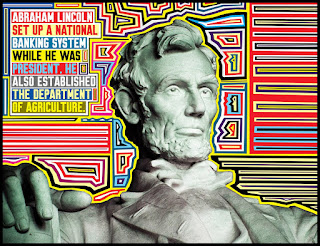The American Civil War and Abraham Lincoln
Millions of people contributed and sacrificed tremendously to the outcome of the American Civil War. Hundreds of thousands of Americans sacrificed everything. Yet one man stands out in history and is credited above all others in influencing the outcome of the Civil War, Abraham Lincoln.
Abraham Lincoln, a former Illinois lawyer, won the Republican Party nomination and became the President of the United States in 1860. The southern states, of which Lincoln only won 2 of 996 counties that he was on the ballot on, began quickly seceding from the Union and forming their own nation, the Confederate States of America. Abraham Lincoln and the majority in the north would not allow the Union to be dissolved, and an American Civil War was imminent.
The war, known to the southerners as the "War of Northern Aggression" or "War Between the States", was immensely feared, but also fiercely anticipated by both sides. Both northerners and southerners gave violent demonstrations and Abraham Lincoln had already evaded assassination attempts even before his inauguration.
In April of 1861 the Confederates fired on South Carolina's Fort Sumter and the fort was forced to surrender under heavy fire. Abraham Lincoln called for 75,000 volunteers to recapture Union forts and quell the uprising. Four more Southern states, including Virginia, seceded from the Union and the American Civil War was officially underway.
Militarily, the north was decidedly losing the war until the battle of Antietam occurred, the single bloodiest day in American history. While still not technically a strategic victory for the North, Abraham Lincoln now at least had enough political leverage to put into law the Emancipation Proclamation, which freed liberated slaves in southern states. While the Emancipation Proclamation had political motivations, it also helped to weaken the southern economy as freed black slaves were now also allowed to join the ranks of the Union army. By the end of the war about 179,000 black men served in the army and about 19,000 served in the navy.
Lincoln had always encountered northern opposition to the American Civil War (mostly anti-war Democrat "copperheads"), but none so drastically until after the battle of Gettysburg. While Gettysburg was a great northern victory, Lincoln had to initiate the war's second draft to replace the staggering 23,000 Union casualties. The northern citizens were far from happy, and even violent. The most notable example is the New York City Draft Riots. The riots were put down and Lincoln continued on and delivered the famous Gettysburg address.
Gettysburg proved to be the turning point in the American Civil War. Union victories at Gettysburg, Vicksburg, and Chattanooga gave the North more confidence and Abraham Lincoln appointed General Ulysses S. Grant army commander. What Grant lacked as a military tactician he made up for in raw aggressiveness, beating the South through attrition with high casualties on both sides. Despite initial fears by the Republican Party (though Lincoln ran under the National Union Party) and war Democrats, Lincoln easily defeated George B. McClellan (former Union general appointed twice by Lincoln) in the 1864 presidential election.
The devastating American Civil War came to a conclusion on April 9, 1865 when General Robert E. Lee surrendered to General Ulysses S. Grant at Appomattox Court House in Virginia. Lincoln could finally focus most of his efforts on reconstruction and beginning to mend the deep scars between the North and South. When asked how defeated Confederates should be treated, Lincoln responded "Let 'em up easy". History had other plans however as on April 14, 1865 at Ford's Theatre in Washington D.C., a single shot by stage actor John Wilkes Booth ended the life of Abraham Lincoln.
Article Source: http://EzineArticles.com/1415696





No comments:
Post a Comment